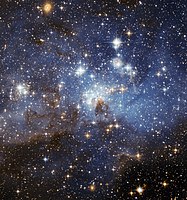
MOND simulation suggests an origin for some peculiarities in the Local Group
Sign Up to like & getrecommendations! Published in 2018 at "Astronomy and Astrophysics"
DOI: 10.1051/0004-6361/201731939
Abstract: The Milky Way (MW) and Andromeda (M31) galaxies possess rotating planes of satellites. Their formation has not been explained satisfactorily yet. It was suggested that the MW and M31 satellites are ancient tidal dwarf galaxies,… read more here.
Keywords: local group; mond simulation; peculiarities local; simulation ... See more keywords

Local group star formation in warm and self-interacting dark matter cosmologies
Sign Up to like & getrecommendations! Published in 2020 at "Monthly Notices of the Royal Astronomical Society"
DOI: 10.1093/mnras/staa2525
Abstract: The nature of the dark matter can affect the collapse time of dark matter haloes, and can therefore be imprinted in observables such as the stellar population ages and star formation histories of dwarf galaxies.… read more here.
Keywords: self interacting; dark matter; star formation; matter ... See more keywords

Massive young stellar objects in the Local Group irregular galaxy NGC 6822 identified using machine learning
Sign Up to like & getrecommendations! Published in 2021 at "Monthly Notices of the Royal Astronomical Society"
DOI: 10.1093/mnras/stab2386
Abstract: We present a supervised machine learning methodology to classify stellar populations in the Local Group dwarf-irregular galaxy NGC 6822. Near-IR colours (J − H, H − K, and J − K), K-band magnitudes and far-IR surface… read more here.
Keywords: machine learning; ngc 6822; galaxy ngc; local group ... See more keywords

A panoramic view of the Local Group dwarf galaxy NGC 6822
Sign Up to like & getrecommendations! Published in 2021 at "Monthly Notices of the Royal Astronomical Society"
DOI: 10.1093/mnras/stab2642
Abstract: We present a panoramic survey of the isolated Local Group dwarf irregular galaxy NGC 6822. Our photometry reaches ∼2–3 mag deeper than most previous studies and spans the widest area around the dwarf compared to… read more here.
Keywords: local group; group dwarf; ngc 6822; galaxy ngc ... See more keywords

The oldest and most metal-poor stars in the APOSTLE Local Group simulations.
Sign Up to like & getrecommendations! Published in 2017 at "Monthly Notices of the Royal Astronomical Society"
DOI: 10.1093/mnras/stw2873
Abstract: We examine the spatial distribution of the oldest and most metal-poor stellar populations of Milky Way-sized galaxies using the A Project Of Simulating The Local Environment (APOSTLE) cosmological hydrodynamical simulations of the Local Group. In… read more here.
Keywords: oldest metal; poor stars; metal poor; local group ... See more keywords

Variable stars in local group galaxies - IV. RR Lyrae stars in the central regions of the low-density galaxy Crater II
Sign Up to like & getrecommendations! Published in 2018 at "Monthly Notices of the Royal Astronomical Society"
DOI: 10.1093/mnras/sty1645
Abstract: We present a search and analysis of variable stars in the recently discovered Crater~II dwarf galaxy. Based on $B$, $V$, $I$ data collected with the Isaac Newton Telescope (FoV$\sim$0.44 square degrees) we detected 37 variable… read more here.
Keywords: crater; galaxy; lyrae stars; local group ... See more keywords

The Local Group on FIRE: dwarf galaxy populations across a suite of hydrodynamic simulations
Sign Up to like & getrecommendations! Published in 2019 at "Monthly Notices of the Royal Astronomical Society"
DOI: 10.1093/mnras/stz1317
Abstract: We present a new set of high-resolution hydrodynamic cosmological zoom-in simulations that apply the Feedback In Realistic Environments physics to both Local Group (LG)-like and isolated Milky Way (MW)-like volumes (10 host systems in total… read more here.
Keywords: odot; local group; mass; galaxy populations ... See more keywords

Local Group Ultra-Faint Dwarf Galaxies in the Reionization Era
Sign Up to like & getrecommendations! Published in 2017 at "Monthly Notices of the Royal Astronomical Society"
DOI: 10.1093/mnrasl/slx043
Abstract: Motivated by the stellar fossil record of Local Group (LG) dwarf galaxies, we show that the star-forming ancestors of the faintest ultra-faint dwarf galaxies (UFDs; ${\rm M}_{\rm V}$ $\sim -2$ or ${\rm M}_{\star}$ $\sim 10^{2}$… read more here.
Keywords: ultra faint; reionization; local group; dwarf ... See more keywords

The evolution of massive stars: bridging the gap in the Local Group
Sign Up to like & getrecommendations! Published in 2017 at "Philosophical Transactions of the Royal Society A: Mathematical, Physical and Engineering Sciences"
DOI: 10.1098/rsta.2016.0267
Abstract: The nearby galaxies of the Local Group can act as our laboratories in helping to bridge the gap between theory and observations. In this review, we will describe the complications of identifying samples of OB… read more here.
Keywords: local group; bridging gap; evolution massive; massive stars ... See more keywords